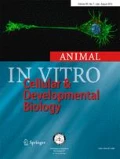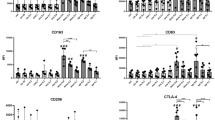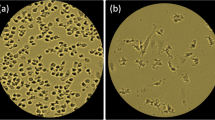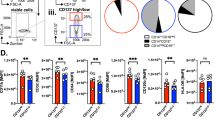Abstract
Besides their role as potent antigen-presenting cells, myeloid dendritic cells (MDCs), but not plasmacytoid dendritic cells (PDCs), have been reported to have cytotoxic or cytostatic activity on some tumor cells. In this article, we analyzed the tumoristatic potential of a distinct peripheral blood monocyte-derived MDC subset which co-expressed PDC-specific marker CD123. CD123+ MDCs represented a subset of small-sized DCs and accounted for 45–60% of peripheral blood monocytes cultured with granulocyte-macrophage colony-stimulating factor and interleukine-4 (IL-4) for 7 d. They exhibited more significant antiproliferative activity toward hematological tumor cell lines of Jurkat, HL60, and myelodysplastic syndromes over-leukemia than CD123− MDCs even at a low effecter/target ratio. Pretreatment of MDC and their supernatant with TRAIL-R2:Fc significantly reduced the tumoristatic effect of CD123+ MDCs but not of CD123− MDCs and their supernatant. CD123+ MDCs expressed higher level of cytoplasmic TNF-α-related apoptosis-inducing ligand (TRAIL) than CD123− MDCs, whereas both expressed very little surface and soluble TRAIL. These results reveal that CD123+ cells represented a predominant subset of MDCs generated from peripheral blood monocytes in vitro, characterized by their potential tumoristic activity partially via cytoplasmic TRAIL.






Similar content being viewed by others
References
Banchereau J.; Steinman R. M. Dendritic cells and the control of immunity. Nature 392: 245–252; 1998. doi:10.1038/32588.
Chapoval A. I.; Tamada K.; Chen L. In vitro growth inhibition of a broad spectrum of tumor cell lines by activated human dendritic cells. Blood 95: 2346–2351; 2000.
Fanger N. A.; Maliszewski C. R.; Schooley K.; Griffith T. S. Human dendritic cells mediate cellular apoptosis via tumor necrosis factor-related apoptosis-inducing ligand (TRAIL). J. Exp. Med. 190: 1155–1164; 1999. doi:10.1084/jem.190.8.1155.
Grouard G.; Rissoan M. C.; Filgueira L.; Durand I.; Banchereau J.; Liu Y. J. The enigmatic plasmacytoid T cells develop into dendritic cells with interleukin (IL)-3 and CD40-ligand. J. Exp. Med. 185: 1101–1111; 1997. doi:10.1084/jem.185.6.1101.
Ho C. S.; Munster D.; Pyke C. M.; Hart D. N.; López J. A. Spontaneous generation and survival of blood dendritic cells in mononuclear cell culture without exogenous cytokines. Blood 99: 2897–2904; 2002. doi:10.1182/blood.V99.8.2897.
Josien R.; Heslan M.; Soulillou J. P.; Cuturi M. C. Rat spleen dendritic cells express natural killer cell receptor protein 1 (NKR-P1) and have cytotoxic activity to select targets via a Ca2+-dependent mechanism. J. Exp. Med. 186: 467–472; 1997. doi:10.1084/jem.186.3.467.
Karanikas V.; Lodding J.; Maino V. C.; McKenzie I. F. Flow cytometric measurement of intracellular cytokines detects immune responses in MUC1 immunotherapy. Clin. Cancer Res. 6: 829–837; 2000.
Labeur M. S.; Roters B.; Pers B.; Mehlinger T. A.; Schwarz T.; Grabbe S. Generation of tumor immunity by bone marrow-derived dendritic cells correlates with dendritic cell maturation stage. J. Immunol. 162: 168–175; 1999.
Markowicz S.; Engleman E. G. Granulocyte-macrophage colony-stimulating factor promotes differentiation and survival of human peripheral blood dendritic cells in vitro. J. Clin. Invest. 85: 955–961; 1990. doi:10.1172/JCI114525.
Nakamura S.; Ohnishi K.; Yoshida H.; Shinjo K.; Takeshita A.; Tohyama K.; Ohno R.; Koide Y. Retrovirus-mediated gene transfer of granulocyte colony-stimulating factor receptor (G-CSFR) cDNA into MDS cells and induction of their differentiation by G-CSF. Cytokines Cell Mol. Ther. 6: 61–70; 2000. doi:10.1080/13684730050515787.
Nestle F. O.; Alijagic S.; Gilliet M.; Sun Y.; Grabbe S.; Dummer R.; Burg G.; Schadendorf D. Vaccination of melanoma patients with peptide- or tumor lysate- pulsed dendritic cells. Nat. Med. 4: 328–332; 1998. doi:10.1038/nm0398-328.
Reid C. D.; Stachpoole A.; Meager A.; Tikerpae J. Interactions of tumor necrosis factor with granulocyte-macrophage colony-stimulating factor and other cytokines in the regulation of dendritic cell growth in vitro from early bipotent CD34+ progenitors in human bone marrow. Reid CDL. J. Immunol. 149: 2681–2688; 1992.
Rissoan M. C.; Soumelis V.; Kadowaki N.; Grouard G.; Briere F.; de Waal Malefyt R.; Liu Y. J. Reciprocal control of T helper cell and dendritic cell differentiation. Science 283: 1183–1186; 1999. doi:10.1126/science.283.5405.1183.
Schmitz M.; Zhao S.; Deuse Y.; Schäkel K.; Wehner R.; Wöhner H.; Hölig K.; Wienforth F.; Kiessling A.; Bornhäuser M.; Temme A.; Rieger M. A.; Weigle B.; Bachmann M.; Rieber E. P. Tumoricidal potential of native blood dendritic cells: direct tumor cell killing and activation of NK cell-mediated cytotoxicity. J. Immunol. 174: 4127–4134; 2005.
Shi J.; Ikeda K.; Fujii N.; Kondo E.; Shinaqawa K.; Ishimaru F.; Kaneda K.; Tanimoto M.; Li X.; Pu Q. Activated human umbilical cord blood dendritic cells kill tumor cells without damaging normal hematological progenitor cells. Cancer Sci. 96: 127–133; 2005. doi:10.1111/j.1349-7006.2005.00017.x.
Terness P.; Chuang J. J.; Bauer T.; Jiga L.; Opelz G. Regulation of human auto- and alloreactive T cells by indoleamine 2,3-dioxygenase (IDO)-producing dendritic cells: too much ado about IDO? Blood 105: 2480–2486; 2005. doi:10.1182/blood-2004-06-2103.
Testa U.; Fossati C.; Samoggia P.; Mariani G; Hassan H. J.; Sposi N. M.; Guerriero R.; Rosato V.; Gabbianelli M.; Pelosi E.; Valtieri M.; Peschle C. Expression of growth factor receptors in unilineage differentiation culture of purified hematopoietic progenitors. Blood 88: 3391–3406; 1996.
Thurner B.; Haendle I.; Röder C.; Dieckmann D.; Keikavoussi P.; Jonuleit H.; Bender A.; Maczek C.; Schreiner D.; von den Driesch P.; Bröcker E. B.; Steinman R. M.; Enk A.; Kämpgen E.; Schuler G. Vaccination with mage-3A1 peptide-pulsed mature, monocyte-derived dendritic cells expands specific cytotoxic T cells and induceds regression of some metastases in advanced stage IV melanoma. J. Exp. Med. 190: 1669–1678; 1999. doi:10.1084/jem.190.11.1669.
Vanderheyde N.; Vandenabeele P.; Goldman M.; Willems F. Distinct mechanisms are involved in tumoristatic and tumoricidal activities of monocyte-derived dendritic cells. Immunol. Lett. 91: 99–101; 2004. doi:10.1016/j.imlet.2003.11.011.
Vidalain P. O.; Azocar O.; Lamouille B.; Astier A.; Rabourdin-Combe C.; Servet-Delprat C. Measles virus induces functional TRAIL production by human dendritic cells. J. Virol. 74: 556–559; 2000.
Ward K. A.; Stewart L. A.; Schwarer A. P. CD34+-derived CD11c+ + + BDCA-1+ + CD123+ + DC: expansion of a phenotypically undescribed myeloid DC1 population for use in adoptive immunotherapy. Cytotherapy 8: 130–140; 2006. doi:10.1080/14653240600620689.
Yang S.; Darrow T. L.; Vervaert C. E.; Seigler H. F. Immunotherapeutic potential of tumor antigen-pulsed and unpulsed dendritic cells generated from murine bone marrow. Cell Immunol. 179: 84–95; 1997. doi:10.1006/cimm.1997.1151.
Zheng Z.; Takahashi M.; Narita M.; Toba K.; Liu A.; Furukawa T.; Koike T.; Aizawa Y. Generation of dendritic cells from adherent cells of cord blood by culture with granulocyte-macrophage colony-stimulating factor, interleukin-4, and tumor necrosis factor-alpha. J. Hematother. Stem. Cell Res. 9: 453–464; 2000. doi:10.1089/152581600419116.
Zhou L. J.; Tedder T. F. Human blood dendritic cells selectively express CD83, a member of the immunoglobulin superfamily. J. Immunol. 154: 3821–3835; 1995.
Author information
Authors and Affiliations
Corresponding author
Additional information
Editor: J. Denry Sato
Rights and permissions
About this article
Cite this article
Wang, M., Shi, J., Wan, Y. et al. A subset of myeloid dendritic cells derived from peripheral blood monocytes represented a predominant subset characterized by their potential tumor-inhibiting activity. In Vitro Cell.Dev.Biol.-Animal 45, 398–404 (2009). https://doi.org/10.1007/s11626-009-9187-4
Received:
Accepted:
Published:
Issue Date:
DOI: https://doi.org/10.1007/s11626-009-9187-4




